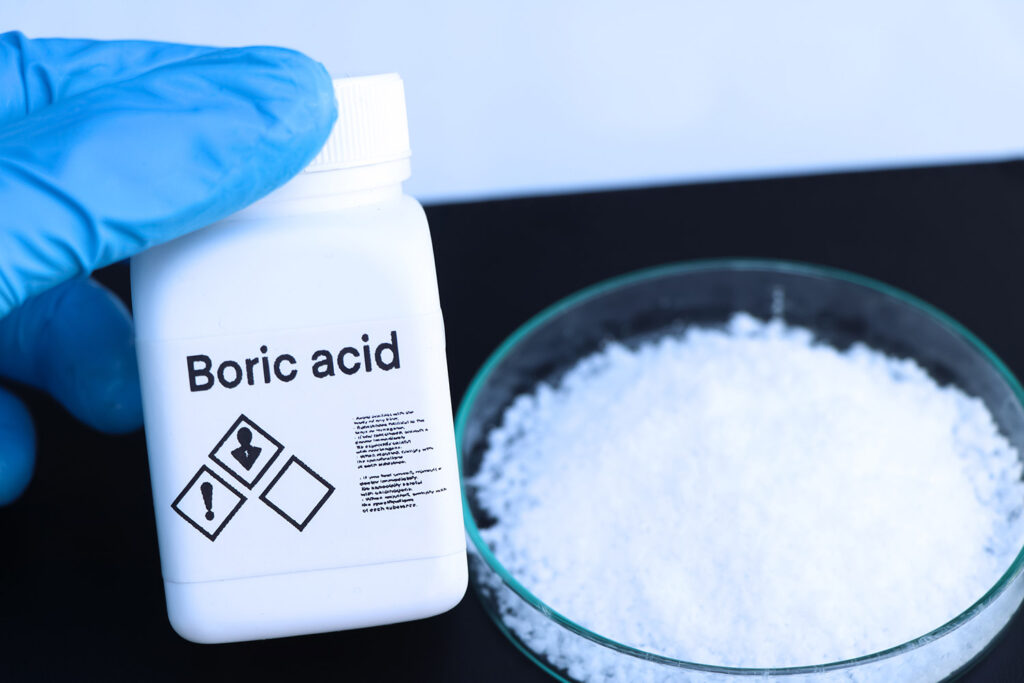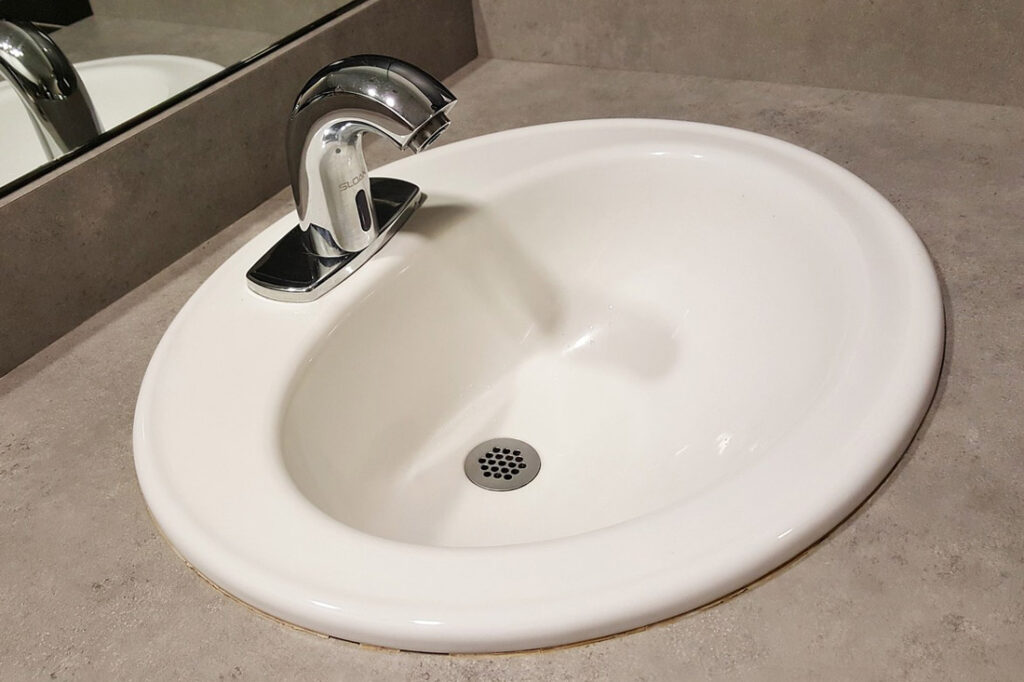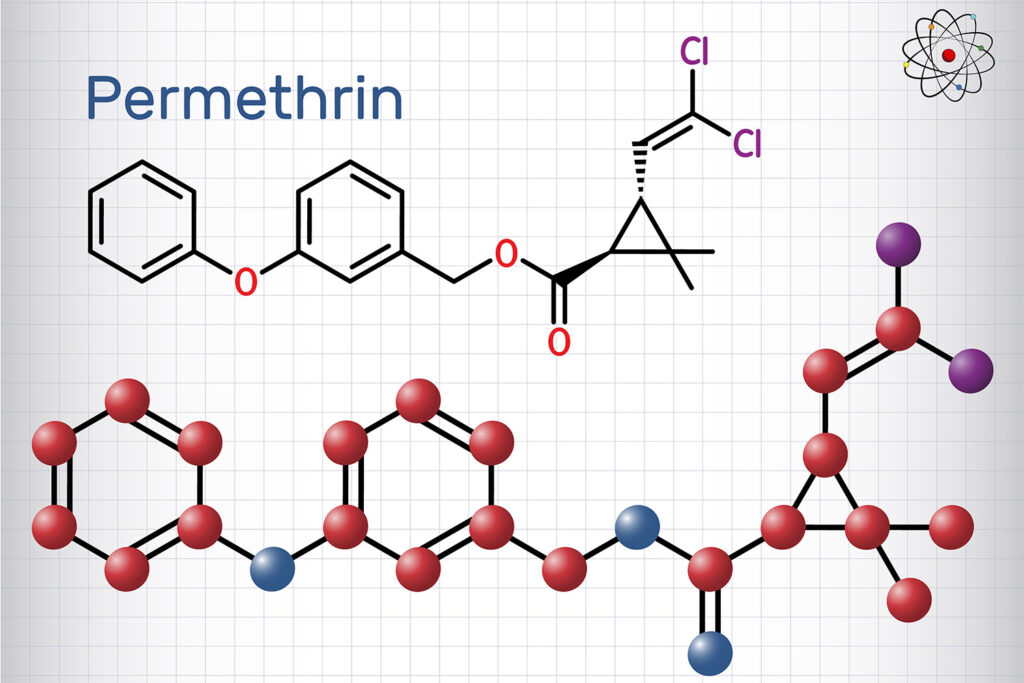Get Immediate Pest Control Help -
1-877-393-3401
Consumers have a lot of choices when it comes to pest control whether it’s hiring out a professional or trying a DIY approach, but any method you choose must also be safe for the people and animals who live in your home. So, whether you’re working with one of the best pest control companies in your area or purchasing a commercially available pesticide, you have to take the time to research ahead of time to ensure you know exactly what you’re bringing into your home.
Boric acid is a commonly used insecticide that’s readily available to consumers across the country. Variations of boric acid are often used as pet-friendly ant killer and to kill termites. You can purchase it at home improvement stores, feed or garden stores, and at many regular grocery stores. It's made with naturally occurring minerals, which is why many homeowners feel it’s safer than the synthetic pesticide alternatives they may see as being too harsh or toxic. However, even though boric acid is effective at treating pests, is it also safe to use around your pets?
👉 Related: Best Ant Killer in 2025
In this article, we’ll outline everything you need to know about boric acid including a definition of what it is, what pests it’s most effective on, how it works, how to use it safely, and most importantly how to ensure your pet’s safety is your top priority.
Get Immediate Pest Control Help -
1-877-393-3401
👉 Recommended reading: What does permethrin kill?
What Is Boric Acid?

Borax acid is a type of borate (a compound made of boron and oxygen) that's registered as a pesticide with the U.S. Environmental Protection Agency (USEPA). Though naturally occurring, boron as an individual element cannot exist on its own and is only found as the compound borate. Among these compounds are boric acid, boron oxide, and salts of borates which can be found in oceans, soil, sedimentary rock, shale, and coal and are mostly located in arid regions of the world.
Although boric acid is commonly used as a pesticide, it’s also used in personal health care products due to its antifungal and antibacterial properties. It’s also used commonly as an antiseptic, preservative, a fire-proofing agent on wood, in ceramics, soaps, and cement. It is usually white and sold in a powder or crystal form that can easily dissolve in water which gives you options for application.
Boric acid is also frequently confused with another common borate called borax (also referred to as sodium borate). While the two compounds are very similar there are a few key differences. Boric acid is actually made from borax after it’s been combined with other acidic minerals and hydrogen. Boric acid is used most commonly as a pesticide by consumers while borax is typically used as a detergent, cleaning product, or fertilizer. Both are readily available in stores and are inexpensive.
Get Immediate Pest Control Help -
1-877-393-3401
Is Boric Acid Safe for Pets?

For the most part, boric acid can be used safely around pets, though it is considered to be mild to moderately toxic if ingested. Furthermore, some states classify boric acid as a hazardous substance which means you should always exercise care any time you use it.
That said, most commercially available pesticides with boric acid do not contain high amounts of the compound and a pet would need to ingest a lot of it to cause a real danger. However, if this does happen it can harm your pet’s respiratory and circulatory systems and in some cases can cause renal (kidney) failure. Indications that your pet has eaten boric acid include vomiting, diarrhea, and general disorientation. Exposure to boric acid can also cause skin irritation or in some cases burns.
All in all, because most consumers will only be using small quantities of boric acid for pest control, it shouldn’t pose too much harm to other people in your household or to pets. Nevertheless, homeowners should refrain from using large amounts of this product or using it over long periods of time, especially in areas of the home where pets can get into. Most household uses of boric acid will be safe for pets as long as you follow all the manufacturer’s directions, take general precautions when applying it and cleaning it up, and follow basic pest control tips to avoid infestations in the first place.
Interestingly, boric acid is also widely used as an eye wash to treat infections for both humans and animals, so there are some applications where it’s safe to use it directly on your pet. However, if this is done you should contact your vet first to make sure this is the right solution to your problem, ensure you’re using a very weak dilution, and closely monitor your pet afterward for signs of discomfort or a reaction.
What Type of Pests Does Boric Acid Kill?
Boric acid has been shown to kill a number of insects and other pests although it’s most commonly used on ants and cockroaches. It can also be used to treat bed bugs, silverfish, fleas, termites, and even slugs and snails in your garden. It is also regularly used as an herbicide and will kill molds and fungi.
Boric Acid Effects on Pests
| Pest Type | Effectiveness | How It Works | Time to Kill |
|---|---|---|---|
| Ants | High | Ingested via sugar mixture or powder, disrupts digestive system | 12-72 hours |
| Cockroaches | High | Ingested during grooming, disrupts exoskeleton and digestive system | 12-72 hours |
| Bed Bugs | Moderate | Contact with powder disrupts exoskeleton | 24-72 hours |
| Silverfish | Moderate | Contact with powder disrupts exoskeleton | 24-72 hours |
| Fleas | High | Contact with powder disrupts exoskeleton | 12-72 hours |
| Termites | Moderate | Ingested via wood treatments, disrupts digestive system | Several days |
| Slugs and Snails | Moderate | Contact with powder disrupts body function | 24-72 hours |
How Does Boric Acid Work?

Boric acid works in much the same way as another popular pesticide, diatomaceous earth (DE), does. Both products come in a powder form that acts as an abrasive agent against the insect's body.
This powder can be sprinkled around areas of bug activity and when the bugs pass through the DE or boric acid, the small shards of the powder tear at the exoskeleton of the insect and slowly break it apart. This damages the outside of their bodies and once the boric acid enters their bodies it disrupts the nervous and digestive systems. This will cause the bugs to stop eating and can induce dehydration.
However, this process doesn’t happen instantaneously and it can take a few days to see results, so patience is key. The affected bugs will also have to bring the boric acid back to their nest where they will eventually die and infect the others. Boric acid is also transmitted when the bugs groom themselves (thereby ingesting it) or when they die and other bugs eat the carcass.
You may have also heard of using a sugar and boric acid mixture to combat smaller pests like ants, which can be quite effective for mild infestations. This method works by attracting the ants with the sugar which they’ll then consume, inadvertently eating the boric acid as well.
Safety Tips for Handling Boric Acid

Bringing any kind of pesticide into your home requires you to follow certain precautions and safe handling tips to make sure it’s used properly and that everyone in the house stays protected. When using the powder it’s a good idea to wear gloves, safety goggles, and a face mask to avoid accidentally ingesting the dust or allowing it to come into contact with your skin for too long.
It’s okay to let the powder sit on affected areas for 24 to 48 hours, but after this time it should be vacuumed or swept up. Ideally, any children or pets should be taken out of the house while it’s applied and while it’s working. This is especially true for animals that may unintentionally get into it or roll around in it, then ingest it when they lick themselves.
Boric acid should also never be used in areas of your house where you prepare food or on plates or utensils. If it does come into contact with a food surface, you should clean it thoroughly. On a superficial level, you should also never use this product on decorative surfaces because it may cause staining.
No one likes to wake up and discover that their house is overrun by ants, cockroaches, or other pests. You may consider hiring a professional exterminator, but when you ask them, “How much does pest control cost?” you may be shocked to see price quotes in the hundreds of dollars. When faced with an expense like this, it’s only natural that consumers will often turn to DIY options, and boric acid is one of the most affordable options when it comes to pest control. It’s easy to get, easy to use, and will take care of mild to moderate infestations for many people.
Is boric acid safe for dogs?
Boric acid can be safe to use around dogs, but only when used as directed. You should not use this product in areas where dogs sleep or where they’re likely to roll around on, and dogs should be removed from the house when it’s being applied.
Is boric acid safe for children?
There is no real harm to children from boric acid except in cases where large amounts are ingested. Because of this, boric acid should always be stored in a safe place where kids can’t get at it. Additionally, you may wish to only use the product when children aren’t in the home to prevent accidental contact.
Is boric acid safe for adults?
Boric acid is considered safe to use around people but it can cause irritation to the eyes or skin if you come into contact with it for prolonged periods of time.
How does boric acid kill roaches?
Boric acid is one of the most popular products that consumers turn to when dealing with a roach infestation because of its affordability and effectiveness. It works so well for cockroaches because they clean themselves and when they do this, they’re also ingesting the boric acid they’ve walked through and has stuck to their legs and body.
The boric acid will also start to absorb through the cockroach's body as it slowly breaks down the exoskeleton. Lastly, cockroaches are also opportunistic eaters, meaning they’ll even eat the dead bodies of other roaches in their nest. When they eat the bodies of roaches that have boric acid in their system, they’ll be exposed yet again to it.
To make sure the product works as intended, you will need to apply the boric acid correctly. This means finding the pathways and areas that the roaches use and applying a layer of the boric acid where they’re most likely to come into contact with it.
How long does it take for boric acid to work?
Boric acid will work the fastest on smaller pests like ants and fleas, but typically takes anywhere from 12 to 72 hours to kill the pest. Note that boric acid only works on adult insects and will not affect eggs which means you will likely have to reapply to break the life cycle of the bug.
Get Immediate Pest Control Help -
1-877-393-3401






